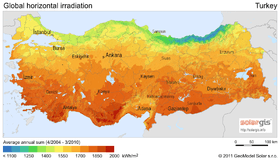Solar power in Turkey
Turkey is located in an advantageous position in Europe for solar energy. Compared to the rest of Europe, insolation values are higher and conditions for solar power generation are comparable to Spain. The government is aiming for at least 3 gigawatts (GW) by 2023.[1]
Insolation
- The annual average total insolation duration is 2640 hours (7.2 hours per day).
- Average annual solar radiation is 1311 kW·h/(m²·yr) or 3.6 kW·h/(m²·d).
Covering one half of one percent of the land area of Turkey with solar panels would be sufficient to generate all of the electricity used.
Policies, laws and incentives
Turkey enacted its second Renewable Energy Law, namely Law No. 6094 Concerning the use of Renewable Energy Resources for the Generation of Electrical Energy, in 2010.[2]
Solar energy sources are covered by this law, which decrees that facilities which generate electricity from renewable energy sources will be granted a renewable energy resources certificate (RER Certificate) which will entitle such facilities to benefit from the incentives provided by the Law. EMRA is the competent authority to grant the RER Certificates.
Systems producing up to 50KW (e.g. residential systems) are more lightly regulated than larger ones. [3]
Systems producing up to 1-megawatt (MW) of energy do not need a license, and plugged into the national grid are eligible for payments of US$0.133 per kilowatt-hour for 10 years.[4]
Systems producing over 1-megawatt (MW) of energy must be licensed, but only if they feed into the grid. Such licences often become mired in the bureaucracy which is meant to ensure the grid can cope.[5] As of May 2015 600MW of these larger installation tenders have been approved. The one off fee per MW varies considerably depending on the result of each tender.
Turkey has a fair feed in tariff.[6] Turkey is already at grid parity for private households and commercial users. In the coming years solar energy will be feasible without any feed-in-tariff mechanism.[7]
Heating and hot water
The main solar energy utilizations in Turkey are the flat-plate collectors in domestic hot water systems. Turkey is one of the leading countries in the world with a total installed capacity of 10 GWth as of 2011 (129 kWth /1,000 inhabitants)[8]
The industry is well developed with high quality manufacturing and export capacity. The number of companies is around 100 and annual manufacturing capacity is 750,000 m².
Photovoltaics
Photovoltaics (PV) are expected to grow dramatically in the next few years.[9] Chinese companies are investing.[10] Solar power plants are manufactured in Turkey and also a prototype dye-sensitized solar cell production plant is to be set up.[11]
| Year | Added PV capacity |
Total (MWp) |
Generated (GWh) |
|---|---|---|---|
| 2008 | 0.75 | 4 | n.a. |
| 2009 | 1 | 5 | n.a. |
| 2010 | 1 | 6 | n.a. |
| 2011 | 1 | 7 | n.a. |
| 2012 | 5 | 12 | n.a. |
| 2013 | 6 | 18 | n.a. |
| 2014 | 40 | 58 | n.a. |
| 2015 | 191 | 249 | n.a. |
| Source: latest IEA-PVPS,[12] previous[13][14][15][16][17] | |||
Concentrated Solar Power
The Greenway CSP Mersin Solar Tower Plant has an installed power of 5 MW constructed at Mersin by Greenway CSP.[18]
See Also
References
- ↑ "Using Solar Energy Sources To Generate Electricity In Turkey".
- ↑ Renewable Energy Law
- ↑ http://english.solarbaba.com/regulation-residential-solar-released
- ↑ http://www.solarnovus.com/policy-in-turkey-encourages-renewable-energy-generation_N7146.html
- ↑ http://www.apricum-group.com/wp-content/uploads/2014/09/pv-magazine-September-2014_Turkish-solar-market.pdf
- ↑ "Turkey Photovoltaic (Solar PV) Market: Outlook 2014 - 2025".
- ↑ http://www.renewableenergyworld.com/rea/news/article/2013/10/why-should-investors-choose-the-turkish-solar-market
- ↑ "SOLAR HEAT WORLDWIDE 2011" (PDF).
- ↑ "Solar Power Surges On Turkish Policy Backing".
- ↑ "CHINESE INVEST IN TURKISH SOLAR ENERGY". Sabah.
- ↑ "Dye Solar Cell Manufacturer Dyesol To Develop Prototype Manufacturing Facility In Turkey".
- ↑ "Snapshot of Global PV 1992-2014" (PDF). http://www.iea-pvps.org/index.php?id=32. International Energy Agency — Photovoltaic Power Systems Programme. 30 March 2015. p. 15. Archived from the original on 30 March 2015. External link in
|website=(help) - ↑ Trends Report 2010
- ↑ Trends Report 2008
- ↑ Trends Report 2009
- ↑ Global Market Outlook for Photovoltaics 2013-2017
- ↑ "Global Market Outlook for Photovoltaics 2014-2018". www.epia.org. EPIA - European Photovoltaic Industry Association. p. 24. Archived from the original (PDF) on 12 June 2014. Retrieved 12 June 2014.
- ↑ "Solar tower at Mersin". Hurriet.
External links
| Wikimedia Commons has media related to Solar energy in Turkey. |
- Turkish Electric Power
- What is Solar Power
- Solar Maps of Turkey
- Turkish Hi-tech enterprise Solar Manufacturer
- Turkey's Established Solar Power Company
- Edessa Solar Project
- Greenway Mersin CSP Tower Plant
